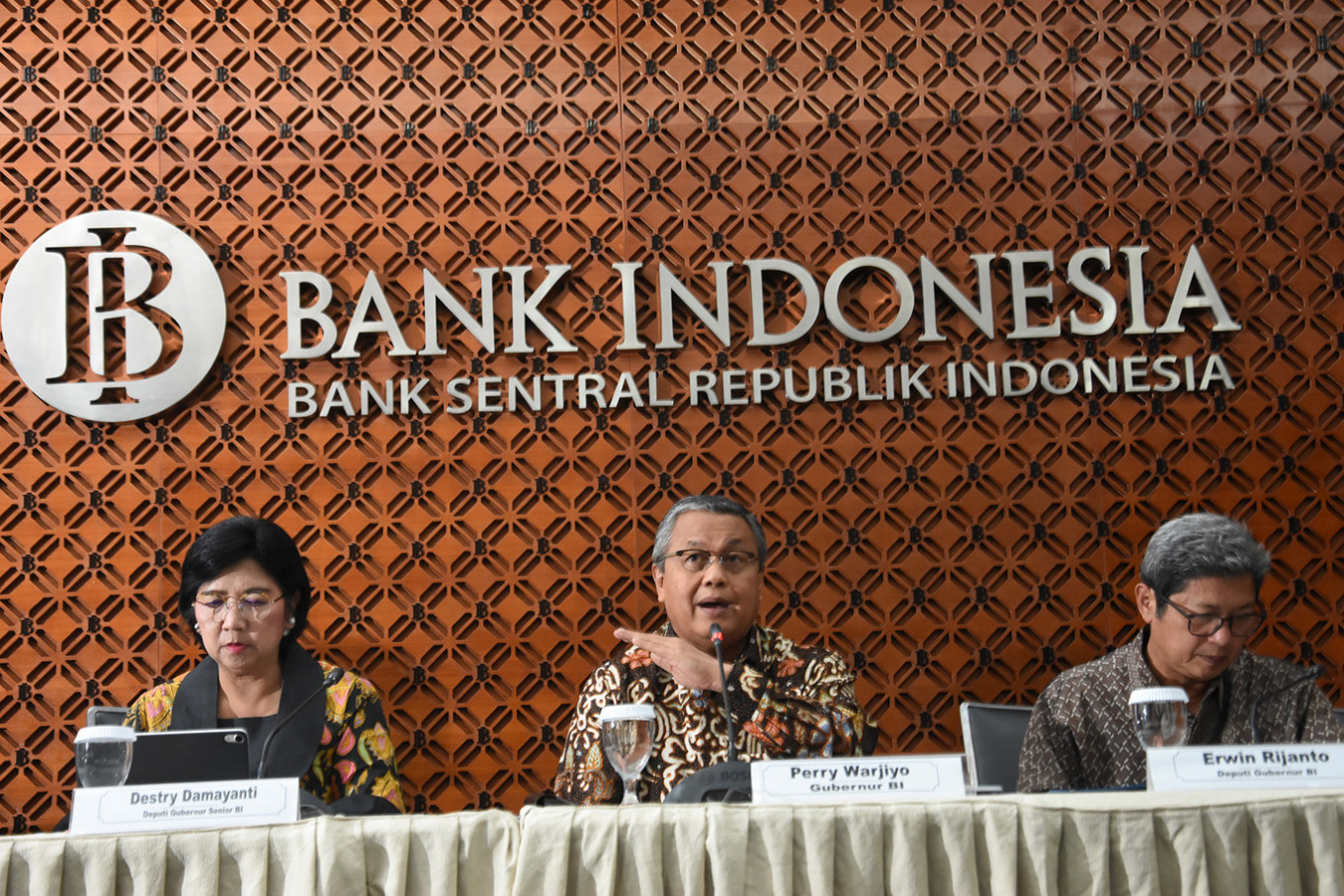Popular Reads
Top Results
Can't find what you're looking for?
View all search resultsPopular Reads
Top Results
Can't find what you're looking for?
View all search resultsManaging economic shocks
What we badly need now in coping with the most pressing health and economic problems caused by the novel coronavirus (we do not know for how long) is a powerful coordinating management and even a sort of crisis management or nerve center directly under the President and comprising related ministers and business leaders.
Change text size
Gift Premium Articles
to Anyone
 Bank Indonesia Governor Perry Warjiyo (center) accompanied by Senior Deputy Governor Destry Damayanti (left) and Deputy Governor Erwin Rijanto, gives a press statement regarding policy measures to maintain monetary and financial stability due to the impact of the coronavirus in the Bank Indonesia building, Jakarta, Monday, March 2, 2020. (Antara/Indrianto Eko Suwarso )
Bank Indonesia Governor Perry Warjiyo (center) accompanied by Senior Deputy Governor Destry Damayanti (left) and Deputy Governor Erwin Rijanto, gives a press statement regarding policy measures to maintain monetary and financial stability due to the impact of the coronavirus in the Bank Indonesia building, Jakarta, Monday, March 2, 2020. (Antara/Indrianto Eko Suwarso )
T
he government, in consultation with business leaders, has taken a series of contingency measures to cope with the supply-demand shocks caused by the closure of most major factories in China, as the world’s second-largest economy and largest global manufacturing center focuses its resources on fighting the novel coronavirus.
We highly commend the strong coordination and cooperation between fiscal and monetary authorities to help industries, businesses and households cope with supply-demand shocks. The Finance Ministry has provided a series of fiscal stimulus measures to the hardest-hit sectors, such as tourism and its related businesses, and is considering additional fiscal incentives to help manufacturing firms that depend mainly on basic materials from China and those that sell their exports mostly to that country.
Bank Indonesia (BI) has launched policy measures to cut credit interest rates and increase the supply of credit — the lifeblood of economic activities — and the liquidity of the foreign exchange market, as well as to defend the rupiah against financial stability risks.
Experiences with the impact of Severe Acute Respiratory Syndrome (SARS) in 2003 suggest that the economic losses from COVID-19 will be the cost of fatalities, workplace closures, containment efforts that restrict the mobility of people and the flow of goods, retrenchment in consumer confidence and business behavior and a tightening financial market.
President Joko “Jokowi” Widodo made a special opening address at the Trade Ministry’s working conference on Wednesday, calling for bold measures to expedite the flow of imports and exports. Smooth imports are needed not only to secure basic materials for manufacturing companies but especially for basic staples and general consumer goods to meet the annual peak consumer demand during the Ramadan and Idul Fitri season starting in the third week of April.
The problem, though, is that in so far as import and export businesses are concerned, policy discussions only within the Trade Ministry are not effective in designing comprehensive solutions because most of the barriers to international trade lie outside its jurisdiction.
In fact, the biggest export and import problems rest with inadequate infrastructure, cumbersome customs clearance, inefficient port-handling and poor land transportation services.
What we badly need now in coping with the most pressing health and economic problems caused by the novel coronavirus (we do not know for how long) is a powerful coordinating management and even a sort of crisis management or nerve center directly under the President and comprising related ministers and business leaders.
An effective decision-making and management center would be more capable of setting the right priority of actions and building up a favorable public-opinion environment to support their implementation.
A combination of the President’s leadership, the right management and coordination given by economic ministers and the support from business leaders represented in the decision-making process will create a greatly conducive environment for managing the economy.
Meetings at the coordinating management center should run as brainstorming sessions that bring the country’s political leadership face-to-face with representatives of main economic agents, all bent on translating the political resolve into real action.









